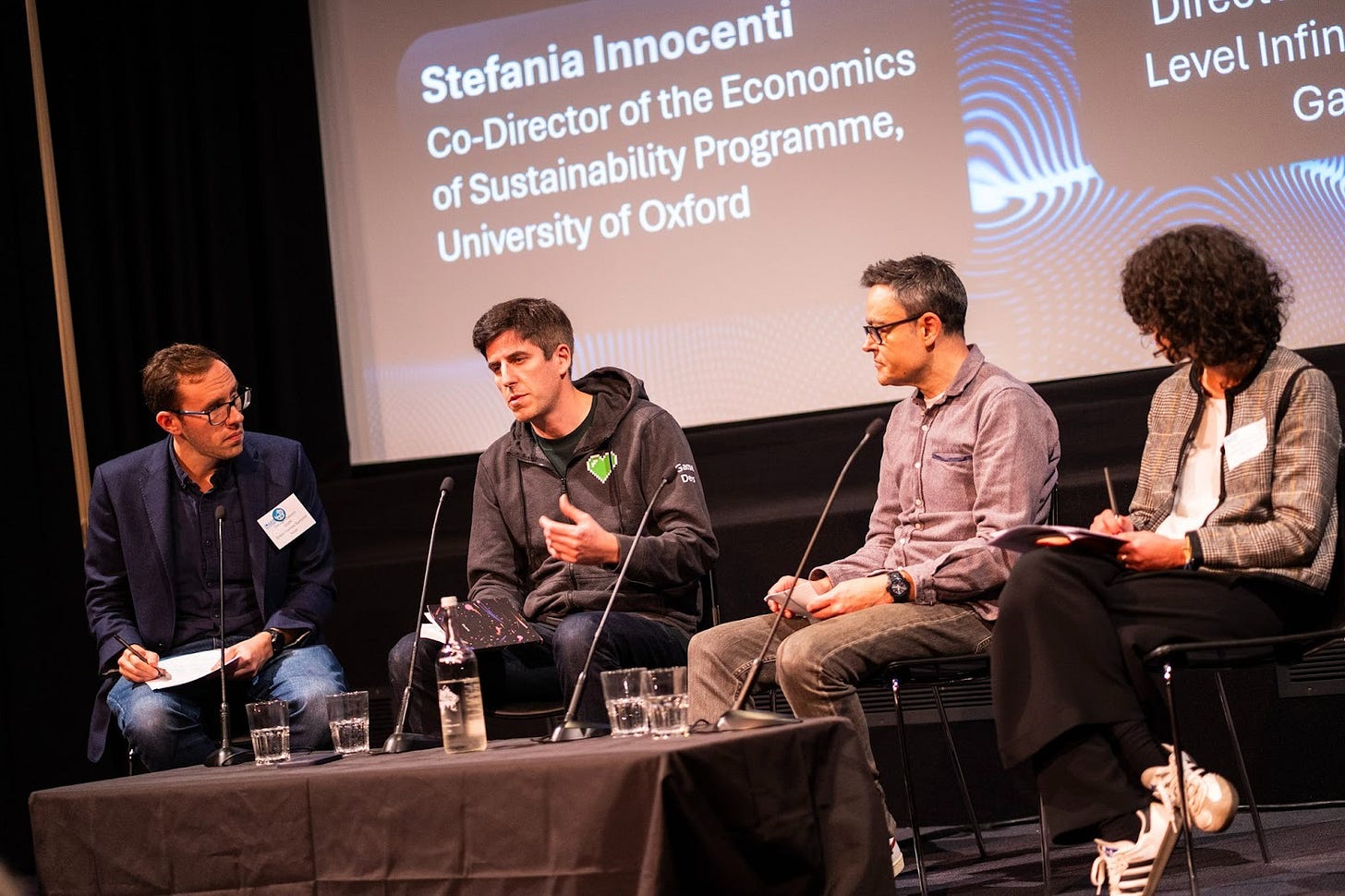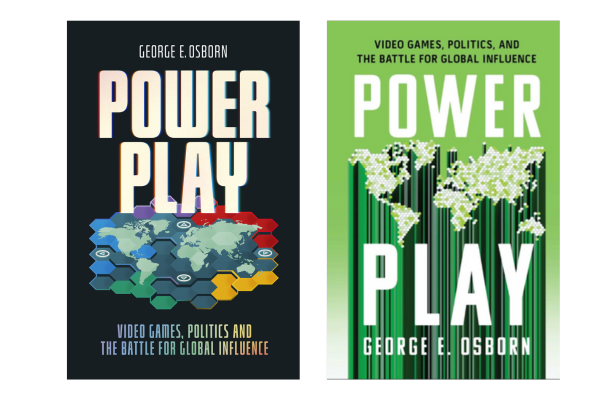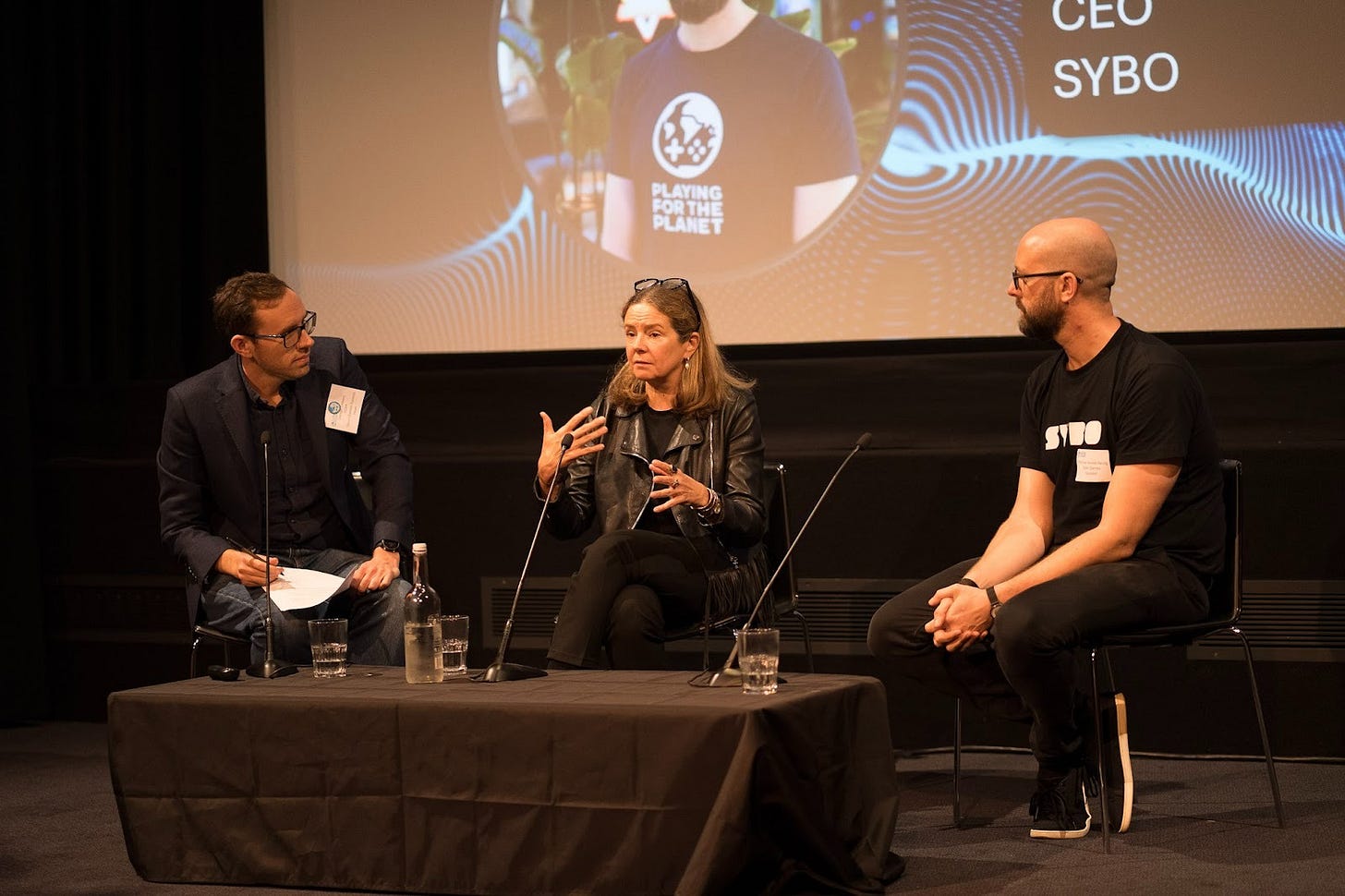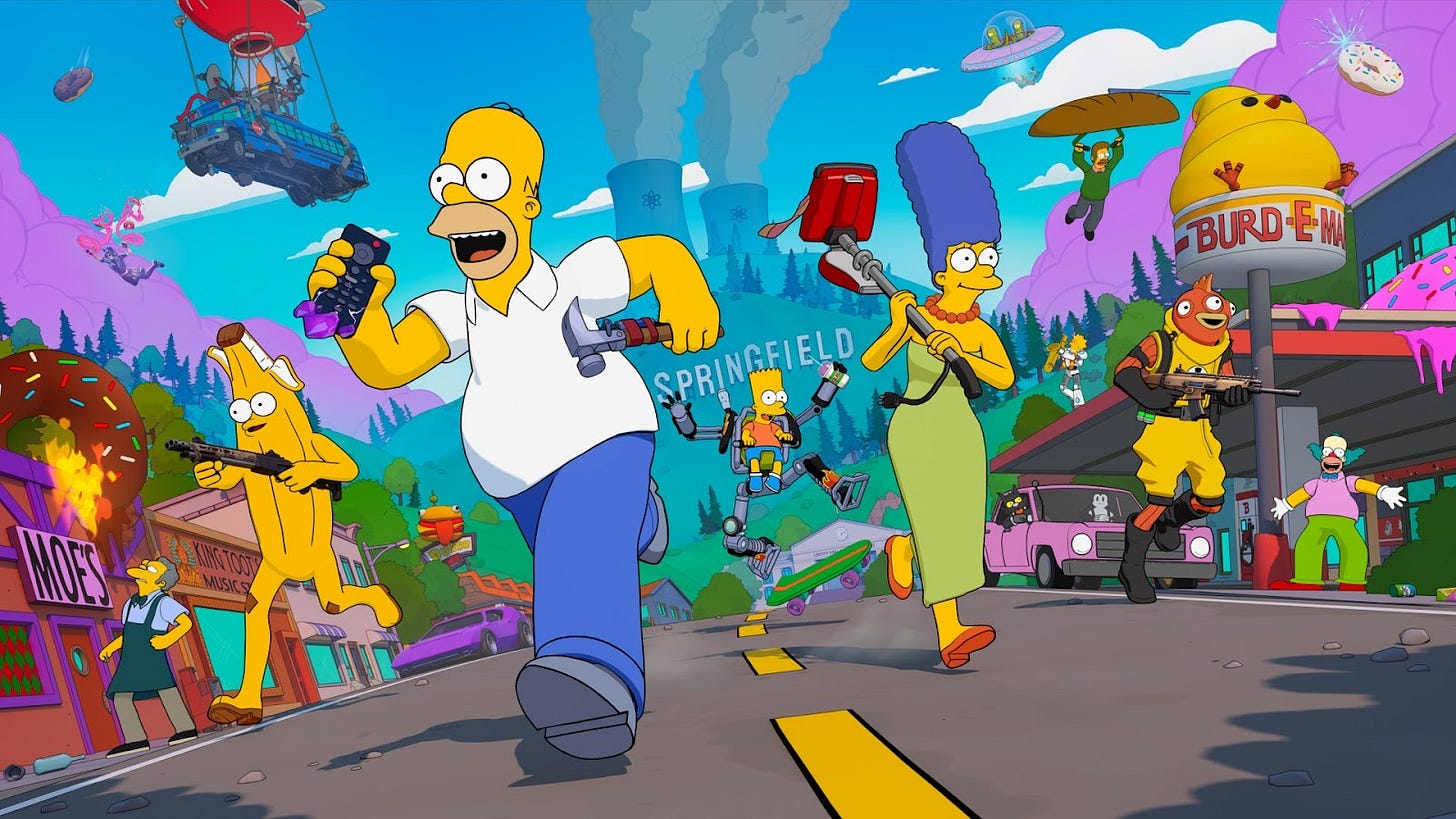Four lessons from the Green Games Summit, 13/11/2025
Also: UK and North American Power Play front covers drop 📚
Team VGIM explores the ins and outs of games and the climate crisis at The Green Games Summit
Epic and Google's third-party app store peace deal comes under scrutiny in the States
Seventh entry in popular Call of Duty series Blops onto devices in this week’s releases
Hello VGIM-ers,
A drum roll, please.
I’m delighted to reveal the final front cover for Power Play: Video Games, Politics, and the Battle for Global Influence for the UK & Commonwealth and North American regions (viewed left to right).
I’m delighted that both covers capture my ambition for Power Play to be a book about politics and games that takes each side just as seriously. Thank you to the teams at Wildfire and Prometheus for their hard work.
So, do you want to get your hands on one of these snazzily covered books when it releases in June 2026?
Head to my Power Play Linktree to pick up a copy of the book from a range of retailers in the UK, North America, and Australia.
And with that utterly relentless self-promotion done, let’s get on with the newsletter.
The big read - Four lessons from the Green Games Summit
Can’t resist a pun: Playing for the Planet’s Green Games Summit returned to London last week in what we would like to call an interesting climate *chuckles to self*.
Setting the scene: The event, which brings together industry professionals, climate experts, and academics to discuss how video games can advance the climate agenda, took place in Central London last Thursday as the industry met to discuss its work in rolling back the climate crisis.
Populism and temperatures on the up: The event occurred at a challenging time for the environmental movement. Despite the UN Secretary General’s warning of ‘dramatic consequences’ if the world doesn’t limit global temperature increases to 1.5 degrees Celsius in the years ahead, populist politicians have directly questioned or challenged the environmental cause across the world.
Learning lessons: The shifting political environment could pose a problem for video game businesses, which have seen their work dragged into the culture wars. However, the industry’s work to decarbonise its development and encourage players to make pro-environmental choices remains strong. And as we saw across the course of the event, this work is having tangible positive effects for the companies involved and the world at large.
PlayStation shows the value of playing together for the planet
Roll out the cliches: There’s the adage that if you want to go somewhere fast you go alone, but if you want to go far you go together. Professor Kieran Mayers, VP Environment, Social and Governance at Sony Interactive Entertainment and chair at Playing for the Planet, illustrated this point extremely neatly when discussing the company’s work in decarbonising its software business.
Stay on targets: Mayers opened his talk by highlighting four key issues that Sony Interactive Entertainment focused on after the Playing for the Planet Alliance was founded in 2019: reducing carbon impact, inspiring environmental action through games, reviewing the effectiveness of measures, and sharing learning within the industry to inspire further action.
Powering a brighter future: Within PlayStation itself, the company’s commitment to these goals is ensuring the business and its player base have less impact on the environment each year. Through the introduction of USB adaptive charging, low-power gaming mode, energy-efficient rest modes, and default adaptive charging, Mayers estimated that the business is on course for an 89% reduction in carbon emissions by 2040.
Expanding the impact: However, Meyer also showed how the company has sought to support the wider community, too. On the academic research front, the company has helped the alliance to sponsor numerous academics and research publications to advance the climate cause. Dr Joshua Aslan, who works with Mayers, also contributed extensively to the cross-industry Carbon Calculator to help all businesses scope out their emissions.
Screen savers: The impact of PlayStation’s work is great within its own business and in the wider game sector. But it also matters because decarbonisation of game technology and software can ripple across the wider economy too. Sarah Cox, Managing Director and Founder of Neutral Human, demonstrated the positive impact of gaming on film and TV through tools like Unreal Engine for virtual production. With 50% of TV and film’s carbon emissions coming from travel and location fuel, literal positive developments in games can have an impact elsewhere: reminding us all of the value of an open and collaborative approach to society’s toughest challenges.
Anna Mahtani
Sustainability is genuinely good for games businesses
Company values: We can all play our part in reducing our carbon emissions as individuals. But in a panel about why sustainability matters to business, María Sayans, CEO of Ustwo Games, and Mathias Gredal Nørvig, CEO of SYBO (Subway Surfer), argued there’s one group of people who can have particular power in the climate conversation: games studio leaders.
With great power comes great responsibility: Both leaders argued that the power and status of games businesses in the modern world mean that companies need to be ready to exercise their influence. ”We as game makers have power, whether we want it or not,” Sayans said. “Every day you have a choice of what to do with that power.” Gredal Nørvig agreed. “If you are incredibly strong, you have to be incredibly kind,” he said, paraphrasing Pippi Longstocking when discussing the enormity of Subway Surfer’s audience.
Challenges ahead: However, both leaders agreed that wielding that power isn’t actually that easy in the current games landscape. UsTwo Games faces many of the challenges that all independent game studios do, including the unpredictability of the current games landscape. SYBO, meanwhile, is a studio of over 150 people, meaning that getting everyone on board with social good campaigns can turn into a small ‘p’ political lobbying campaign.
Positioning benefits: However, both leaders argue strongly that their focus on promoting sustainability has been a clear net benefit for business. For Sayans, the commitment to sustainable game development has given the studio a clear identity. Its status as a B-Corp has encouraged similarly minded staff through its door. Its climate consciousness has allowed it to create games like Alba: A Wildlife Adventure, which successfully cut through to an audience in a congested market. Thinking sustainably about the environment also translates well to thinking sustainably about the business at large, a big plus in these tricky times.
Deeper benefits: Gredal Nørvig agrees. In a similar vein to ustwo, SYBO’s commitment to environmental themes has given it cut-through in the mobile games market. Within Subway Surfers itself, green activations are both well-received by players and storefronts, giving it a promotional edge in the market. And within the business itself, the commitment to sustainability has given the company an edge when recruiting and retaining staff. People, ultimately, like to do good. And giving them the chance to do so in their day job is a powerful way for games businesses to get a positive edge in a tough market.
AM
A message from our sponsor PXN: Remember that feeling? The wrong version goes out. The embargo breaks early. The launch day turns into chaos. You don’t need to live that story again.
With PXN, your digital PR assistant, every campaign runs smoother: deadlines met, teams aligned, clients impressed. Set smart resolutions for 2026 early - get in touch with PXN today.
Video games can change the way you behave (when designed properly)
Lack of evidence: Having spent the best part of two years writing a book about how video games and their communities can meaningfully influence the world, there’s one thing that’s surprisingly thin on the ground: robust academic evidence as a channel for behaviour change.
Serious credentials: Fortunately, Professor Steffania Innocenti is on hand to save my bacon (and, quite possibly, encourage us all to eat a little less of it). Innocenti, who is an Associate Professor and behavioural economist at the Smith School of Enterprise and the Environment at the University of Oxford, sought to explore whether games with positive environmental narratives could meaningfully influence how people act. And the answer appears to be ‘hell yes’.
Versions control: In contrast to lots of research around games, which can be, well, a little rough around the edges, Innocenti’s approach was fascinatingly in-depth. The professor’s team worked with Media Molecule to create four versions of a game that aimed to steer players towards making more sustainable food choices. Players were split across four versions of the game: a control version, one that focused on nature messaging, one that focused on gentle social pressure to make choices, and one that combined nature and social messaging. For example, players who played one of the nature versions would see how their food choices impacted the environment through visual representations of the landscape. Players in the control version didn’t.
S H O P P I N G, We’re Shopping: And to precisely measure the impact of the games on people’s choices, Innocenti’s team created an ingenious surveying tool. The sample of roughly 4,500 players was given a fake version of an online supermarket to buy a £50 food shop. They then completed the exercise after playing the game, and then three weeks later. In return, some lucky respondents would get the food shop sent to their door. This encouraged respondents to fill it in properly, while giving Innocenti and her team an online food shopping nightmare in the process.
Fun and informative: However, the logistical challenges of sending shopping across the country proved worthwhile. According to Innocenti, players who experienced ‘green’ versions of the game had a 20% greener shopping basket than those who played the control version. Importantly, the messaging in all three versions of the game didn’t have a noticeable effect on whether players thought the game was fun or boring, meaning sustainable messaging didn’t turn off players in the process.
Decision trees: So, it’s a slam dunk for games as a way to change minds? Not necessarily. Innocenti said that exercises like this are much more difficult to run when the choice facing someone is both less obvious and less important. She also warned that players who played the ‘social’ version of the game were more likely to say they were being manipulated than other players. Companies need to take care to deliver messages sensitively, or risk turning their audience off.
Spreading influence: Still, the findings show that games can play a meaningful role in changing how people make decisions in their lives. And while the research findings are integral to the climate movement’s success, don’t be surprised to see her conclusions influence designers across a range of issues in the future.
George Osborn
Games can spark the imagination that can save the world
Oh my Ghosh. “Climate change is [...] a crisis of the imagination,” according to the anthropologist and writer Amitav Ghosh. Fortunately, the Green Games Summit rounded off with two sessions that suggested video games might just be the way to spark that all-important imagination.
Capacity reached: Dr Tom Matthews, a climate scientist at King’s College London and an actual, real-life bloody explorer, doubled down on Ghosh’s point in his talk about the likely direction of the climate crisis. “More extreme weather is inevitable,” he said. But as humans, “our observational capacity is short”.
Failure of the imagination: In essence, we find it really hard to understand that the random number generator that ‘rolls’ extreme weather events is rolling those events more frequently. That means we see extreme climate events like Hurricane Melissa, the Nepal Snowstorm, and the European heatwaves all happening across 2025, but can’t imagine what that means for our day-to-day existence: stalling action to stop it.
Wider horizons. That, however, is where games could come in. Wolfgang Blau, Global Managing Partner for the Brunswick Group and founder of the Oxford Climate Journalism Network, joined the final panel of the day to talk about what’s next for games. And he keenly argued that the medium has an important role to play because the way we all think about the world has shifted dramatically in the past decade.
Show, don’t tell: After working both as a leading journalist and with other writers across the world, Blau argues that the traditional way we think of changing people’s minds is no longer working. The idea that you can sit someone down with one set of facts, tell them to believe it, and watch them walk away is gone. Instead, you need to convince them by allowing them agency to understand the story on their own terms - inspiring them to act that way.
Powering the imagination: Therefore, Blau and Matthews both suggest in their own ways that games can unlock that imagination. Sony’s Climate Station game, which allows people to simulate how different extremities of climate change could reshape the world, is one way of doing this.
Simulation game: But games can activate the imagination more widely. Player Unknown Battleground’s Ruins of Erangel map, which showed a popular in-game environment devastated by a hundred years of climate change, reached millions around the world. And while it isn’t climate-related, simulation games like Plague Inc - which models the spread of the pandemic - have proven effective at turning theory into reality for players: something the climate movement could benefit from.
Reclaiming agency. Games give players the ability to see change and have agency in that change. By collaborating with policy makers and researchers, creatives have a chance to tell stories that matter on a larger scale than ever before. And with the world taking games seriously, it’s time for us to take our impact on the world as seriously in return.
AM
News in brief
Smoke-filled rooms latest: Epic Games and Google looked to have buried the legal hatchet last week, after announcing a deal that they hoped would see the Play Store cracked open to third parties. The companies announced that they had reached an agreement over the inclusion of third-party platforms on the store, as well as new ‘maximum’ commission fees of 9% for cosmetic purchases and 20% for spending overall. But Neil Long at mobilegamer.biz reports that Judge James Donato believes the proposal is “not an adequate remedy for Google’s wrongdoing”, - throwing the deal into doubt. Watch this space…
Roblox and extremism: We’ve finally caught up with a nuanced paper from the Global Network on Extremism and Technology (GNET) about the presence of extremist content on Roblox. Researchers have found a range of offending content on the platform, including experiences, chat, and items created by the community which reference far-right aesthetics, anti-semitism, and Islamist terror. But researchers also found that much of the offending content was designed to skirt existing moderation systems, showing the tricky challenge of policing an ever-evolving online landscape.
Indonesia and violent games: Indonesian authorities are mulling a ban on violent games following a bombing at a school in Jakarta last week. The attack, which injured 96 people, was allegedly instigated by a 17-year-old, who was found with a toy gun emblazoned with references to the shooter responsible for the Christchurch attack in 2019. Once again, this is an example of policymakers focusing too much on the content of games rather than the context of extreme communities that co-opt the medium. This leads to policies that are equivalent to suggesting that changing the offside rule would end football hooliganism.
Steaming on up: Valve has announced a wave of new Steam devices to take on the rest of the games hardware market. The Steam Machine is a new mini PC designed to make pulling up your Steam library on a TV a cinch. The Steam Frame, meanwhile, is a standalone VR headset that allows players to play games on the headset directly or by streaming them from a nearby PC. Valve also announced a new Steam handheld controller because why not?
Pausing the heist: Grand Theft Auto VI has been delayed to November 2026. Rockstar’s decision to again postpone the release of the game to ensure it has “the level of polish you have come to expect and deserve” was unwelcome news to fans who were hoping to get their hands on it next Summer. Authors who have their debut non-fiction book about video games and politics releasing in June 2026? They’re delighted about it, apparently.
A message from our sponsor PXN: No more hunting for files or stressing over embargoes. Just calm control, creative flow, and work you’re proud to share.
Because your next campaign deserves more than a generic file-sharing tool. It deserves a partner that strengthens relationships and showcases your work the right way.
Set smarter goals for 2026. Get ahead, get organised, and get in touch today at pxn.world.
Moving on
Robin Flodin is the new CEO of RIG, a holding company that has rolled up Outright Games, Auroch Digital, Game Mill Entertainment and multiplayer tech business Coherence…Josh Goldie has popped up as the new Senior Account Manager at Raptor PR…Issy van der Velde is the new Deputy Editor, PC Gaming Show at Future…And Into Games has appointed several new trustees, including Colin Macdonald, Viki Freeman and Danny Gray to support its not-for-profit work…
Jobs ahoy
Sony Interactive Entertainment is recruiting for a new Director, EMEA Public Policy, over in Brussels…Epic Games, meanwhile, has reposted its Director, Public Policy (Ecosystems | Products) role…Future is hiring for an Advertising Account Manager…YRS TRULY is hiring a new Campaign Manager…And if you’re looking to hire someone to help you with your game soundtrack, the UK Games Composers database has been given a big update here…
Events and conferences
Unite, Barcelona - 19th-20th November
AdventureX, London - 22nd-23rd November
VGIM 2nd Birthday Drinks sponsored by Fifty, Renaissance PR, and The Games Rating Authority, London - 26th November (Waiting list only)
Games Gathering, Kyiv - 27th-30th November
The Game Awards, Los Angeles - 11th December
Games of the week
Call of Duty: Black Ops 7 - Latest entry in the long-running COD saga goes toe-to-toe with Battlefield 6 in the battle for FPS players’ hearts.
Anno 117: Pax Romana - Ubisoft’s latest city builder threatens to blow open the “all men are obsessed with the Roman Empire” social media chatter.
Lumines Arise - Beloved puzzle game series returns in utterly absorbing Tetris Effect style form on PS5 and Steam.
Before you go…
Venezuela’s military was keen to show off its new drone pilot training software to the press last week, proudly displaying rows of arcade machines running supposedly state-of-the-art software.
Except there was a bit of a problem. The machines weren’t running simulation tools capable of training the next generation of drone pilots.
Instead, they were running copies of the cheerily titled FPV Kamikaze Drone - a Russian-developed video game currently available on Steam for less than a fiver.
Close enough, I guess.










